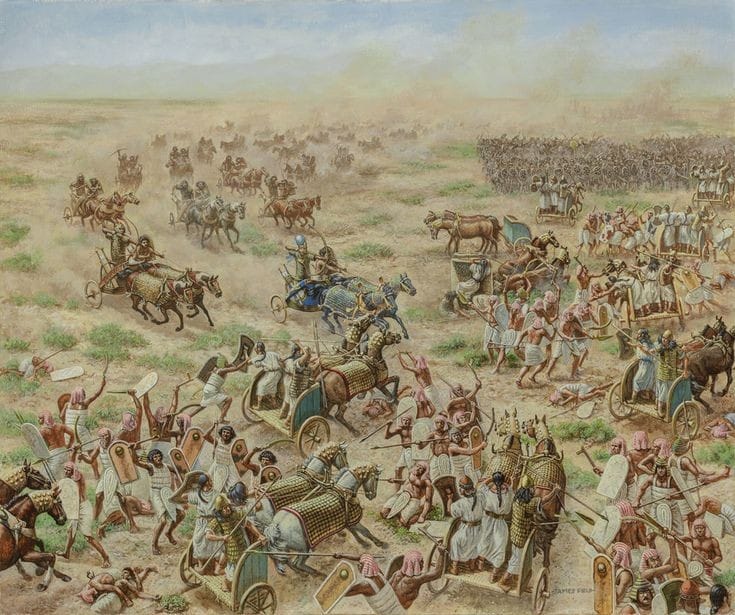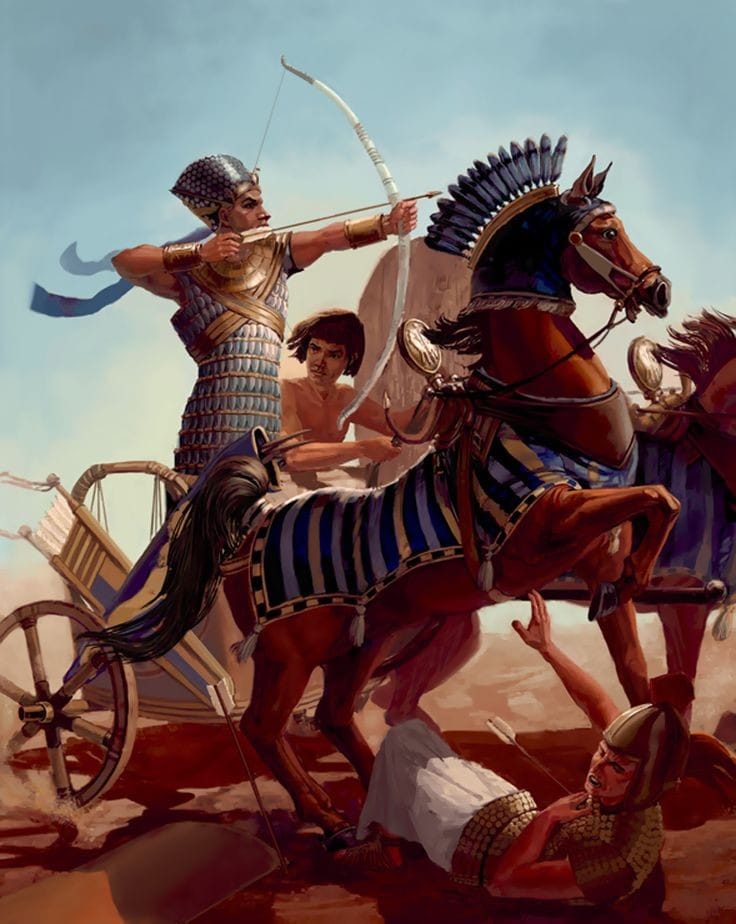The Dawn of Diplomacy: History’s First Peace Treaty

?What if the key to ending centuries of conflict was an agreement over a simple piece of silver
?What if the greatest battles in history could lead to the deepest moments of peace
The Battle of Kadesh, fought in 1274 B.C. between the Egyptians and the Hittites, not only reshaped the political landscape of the ancient Near East, but also led to one of the oldest recorded peace treaties in history.
Preface to the Battle
In one of the world’s largest chariot battles, the city of Kadesh stood as a strategic prize, coveted by both the Egyptian pharaoh Ramesses II and the Hittite king Muwatalli II. The stage was set for a showdown of regional ambitions and conflicts. Ramesses sought to expand his empire, while Muwatalli sought to protect the interests of the Hittites. Their armies, numbering in the tens of thousands, marched toward destiny.
Clash of the Titans
On that day, the sun rose over the plains of Kadesh, casting long shadows as the two forces prepared for battle. The confident and well-equipped Egyptian army was caught off guard by a Hittite ambush. The Muwatalli chariots, known for their speed and maneuverability, struck with precision, causing chaos among the Egyptians.
But Ramesses was not easily defeated. With exceptional courage, he rallied his forces and led a counterattack, displaying flexibility and tactical prowess that became legendary. The battle dragged on for hours, with neither side able to claim a decisive victory.
Aftermath and the Road to Peace
In the aftermath of the battle, both sides suffered heavy losses, leading to a stalemate that neither could sustain. It was clear that continuing the war would only weaken the two empires. Thus, the seeds of diplomacy were planted. Negotiations began, eventually leading to the signing of the first historic peace treaty around 1258 BC.
Inscribed on a silver tablet, the treaty spelled out peace treaties and agreements, marking a major shift from war to diplomacy. Not only did the document highlight the importance of peaceful coexistence, it also set a precedent for future international relations.
Unfortunately, it has been lost to time. However, it is still considered the first recorded peace treaty in human history.
The Treaty’s Legacy
The Treaty of Kadesh has become a symbol of diplomatic progress, demonstrating that even the fiercest adversaries can find common ground. The treaty also established a framework for future treaties and alliances, influencing diplomatic practice for centuries to come. The story of Kadesh serves as a reminder that peace, though hard to achieve, is often more lasting than the glory of battle.
In a world where conflict seems all too common, the first peace treaty reminds us of the possibility of dialogue and understanding, a legacy that continues to resonate in modern diplomatic efforts. As we reflect on this pivotal moment in history, we are reminded that even the strongest warriors can lay down their arms in the name of peace.
The Dawn of Diplomacy: History’s First Peace Treaty
What if the key to ending centuries of conflict was an agreement over a simple piece of silver?
What if the greatest battles in history could lead to the deepest moments of peace?
The Battle of Kadesh, fought in 1274 B.C. between the Egyptians and the Hittites, not only reshaped the political landscape of the ancient Near East, but also led to one of the oldest recorded peace treaties in history.
Preface to the Battle
In one of the world’s largest chariot battles, the city of Kadesh stood as a strategic prize, coveted by both the Egyptian pharaoh Ramesses II and the Hittite king Muwatalli II. The stage was set for a showdown of regional ambitions and conflicts. Ramesses sought to expand his empire, while Muwatalli sought to protect the interests of the Hittites. Their armies, numbering in the tens of thousands, marched toward destiny.
Clash of the Titans
On that day, the sun rose over the plains of Kadesh, casting long shadows as the two forces prepared for battle. The confident and well-equipped Egyptian army was caught off guard by a Hittite ambush. The Muwatalli chariots, known for their speed and maneuverability, struck with precision, causing chaos among the Egyptians.
But Ramesses was not easily defeated. With exceptional courage, he rallied his forces and led a counterattack, displaying flexibility and tactical prowess that became legendary. The battle dragged on for hours, with neither side able to claim a decisive victory.
Aftermath and the Road to Peace
In the aftermath of the battle, both sides suffered heavy losses, leading to a stalemate that neither could sustain. It was clear that continuing the war would only weaken the two empires. Thus, the seeds of diplomacy were planted. Negotiations began, eventually leading to the signing of the first historic peace treaty around 1258 BC.
Inscribed on a silver tablet, the treaty spelled out peace treaties and agreements, marking a major shift from war to diplomacy. Not only did the document highlight the importance of peaceful coexistence, it also set a precedent for future international relations.
Unfortunately, it has been lost to time. However, it is still considered the first recorded peace treaty in human history.
The Treaty’s Legacy
The Treaty of Kadesh has become a symbol of diplomatic progress, demonstrating that even the fiercest adversaries can find common ground. The treaty also established a framework for future treaties and alliances, influencing diplomatic practice for centuries to come. The story of Kadesh serves as a reminder that peace, though hard to achieve, is often more lasting than the glory of battle.
In a world where conflict seems all too common, the first peace treaty reminds us of the possibility of dialogue and understanding, a legacy that continues to resonate in modern diplomatic efforts. As we reflect on this pivotal moment in history, we are reminded that even the strongest warriors can lay down their arms in the name of peace








